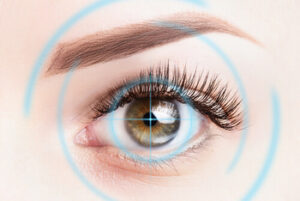Ever dream of ditching those glasses or contact lenses for good and achieving clear vision without them? Laser eye surgery might be your ticket to freedom! But before you zoom off to the nearest clinic, it’s important to understand if you’ve reached the requirement of “laser eye surgery minimum age” and if you’re otherwise a good candidate.
This guide will give you the lowdown on the minimum age for laser eye surgery and other factors that come into play. We’ll explore the sweet spot for getting the best results, what to consider beyond just age, and break down the different types of laser vision correction available. Plus, we’ll give you a heads-up on what to expect during the procedure and answer some burning questions to help you decide if laser surgery is right for you. So buckle up and get ready to see the world in a whole new light (literally)!
Laser Eye Surgery Minimum Age: Understanding The Requirement
The legal minimum age for laser eye surgery in Australia is typically 18. However, responsible eye surgeons often recommend waiting until your early to mid-twenties. This is because your vision prescription tends to stabilise around this age. Undergoing laser eye surgery with an unstable prescription can lead to imperfect results, potentially requiring further corrective procedures.
Ditch The Specs And See Clearly: Perks Of Laser Eye Surgery
Let’s face it: glasses and contacts can be a real drag. Ever woken up and rummaged around for your specs, only to realise they’re perched on your head? Or maybe you’ve lost a contact lens during a workout, leaving you blinking like a confused owl. Laser eye surgery can be your ticket to ditching the whole routine and seeing the world clearly without the hassle. Here’s how:
- Wake Up And See: Imagine rolling out of bed and seeing perfectly without fumbling for your glasses. Pretty sweet, right? Laser eye surgery can make this a reality, allowing you to start your day without a blurry search for your specs.
- Sharper Than Ever: Say goodbye to squinting and hello to crisp, clear vision! Laser eye surgery can significantly improve your vision quality, especially if you have nearsightedness, farsightedness, or astigmatism. It’s like getting an HD upgrade for your eyes.
- Convenience King/Queen:
- Confidence Boost: Let’s be honest, glasses and contacts can sometimes feel like a bummer. Laser eye surgery can boost your confidence by eliminating the need for them. Hit the beach, play sports, or just rock that new hairstyle—all without worrying about your glasses getting in the way.
- Active Lifestyle Ready: Whether you’re a gym rat, love weekend hikes, or enjoy an active life, glasses and contacts can be a pain. Laser eye surgery can free you from those limitations. Hit the court, jump in the pool, or chase after your dog—all without worrying about your vision correction getting in the way.
Beyond the Age Limit: Unveiling Other Eligibility Factors
While the minimum age for laser eye surgery sets a baseline, it’s not the only factor determining if you’re a superhero-worthy candidate for ditching the glasses. Here’s what else your friendly neighbourhood eye surgeon will consider:
Stable Vision Is Key
Imagine a constantly shifting target—that’s not ideal for laser surgery! Your eye doctor will want to see if you have a stable prescription for at least a year. This ensures the laser correction hits the bullseye and delivers long-lasting results. If not, your eye specialist will recommend the best age possible.
Overall Health Matters
Just like any superhero needs to be in tip-top shape, good general health is important for undergoing surgery. Your eye surgeon will assess your overall health and review your medical history during a consultation to ensure you’re ready to conquer blurry vision.
Ocular Health Is The Name Of The Game
Existing eye conditions that affect healthy eyes, like dry eye syndrome or corneal abnormalities, can affect your candidature. Don’t worry; your eye surgeon will address your comprehensive eye health assessment to see if laser vision correction is your ultimate weapon against blurry vision.
Know Your Cornea’s Thickness
Think of your cornea as a superhero’s shield; it needs to be strong enough to withstand the laser’s precision attack. The surgeon will measure your corneal thickness to ensure it suits the laser procedure.
Realistic Expectations Are Your Sidekick
Aiming for laser vision that’s better than 20/20 might be too ambitious. It’s essential to have realistic expectations about the final outcome. While the goal is to achieve excellent vision, perfect vision isn’t always guaranteed. But hey, even without X-ray vision, seeing the world clearly without glasses is a pretty epic superpower!
Not All Laser Heroes Wear Capes: Exploring Your Laser Eye Surgery Options
So, you’ve unlocked the eligibility criteria and are ready to explore your laser vision correction options! Here’s a breakdown of the most common laser eye surgery techniques, each with its strengths to combat your blurry vision nemesis:
LASIK Surgery (Laser-Assisted In Situ Keratomileusis)
LASIK eye surgery is the ultimate laser all-star, correcting nearsightedness, farsightedness, and astigmatism. It works by creating a thin corneal flap, reshaping the underlying tissue with a laser beam, and then repositioning the flap. Imagine it as an experienced LASIK surgeon meticulously reshaping your eye’s dome for crystal-clear vision!
PRK (Photorefractive Keratectomy)
This OG laser technique removes a thin layer of the cornea’s surface before using the laser to reshape the tissue. It is a more direct approach suitable for those with thinner corneas and somewhat severe refractive errors who can’t quite rock the LASIK flap technique.
SMILE (Small Incision Lenticule Extraction)
SMILE Pro
An advanced version of SMILE, SMILE Pro utilises additional data points to personalise the laser treatment for your unique corneal anatomy. Think of it as a precision laser technique offering potentially even better visual outcomes and a wider range of eye patients who can benefit from this minimally invasive procedure.
Suit Up For Laser Surgery: What To Expect On The Big Day
So, you’ve chosen your laser vision correction technique and are ready to suit up for battle against blurry vision! Here’s a heads-up on what to expect on the day of your laser eye surgery:
Pre-Op Prep
Think of it as your superhero origin story! Your surgeon will repeat the procedure and answer any last-minute questions. You might also need to avoid wearing makeup, lotions, or perfumes around your eyes to minimise the risk of infection.
Laser Time
Buckle up because this is where the real action happens! The laser procedure is typically an outpatient process with numbing eye drops to keep things comfortable. The specific steps will change depending on the chosen technique but generally involve using a laser to reshape the cornea or implant an artificial lens. It’s usually a quick process, lasting around 30 minutes per eye.
Recovery Mode
Emerging from laser surgery might feel like waking up with a slight hangover for your eyes. You might experience temporary discomfort, blurred vision, and light sensitivity. But don’t worry; this is all part of the healing process. Your surgeon will recommend:
- Detailed instructions on using prescribed eye drops.
- Wearing protective eye shields.
- Avoiding strenuous activities to ensure a smooth recovery.
Most patients experience tangible improvement in vision within a few days, with continued improvement over the following weeks or months.
Frequently Asked Questions
Can I get laser eye surgery if I’m over the minimum age but my vision is still fluctuating?
It’s best to wait until your vision prescription has been stable for at least a year before undergoing laser eye surgery. Undergoing the procedure with an unstable prescription can lead to inaccurate results and potentially require further procedures later.
I’m pregnant or breastfeeding. Can I still consider laser eye surgery?
Pregnancy or breastfeeding can cause hormonal changes that affect your vision. It’s generally recommended to wait until you’re finished breastfeeding and your hormones have stabilised before considering laser eye surgery. Discuss this with your eye surgeon during a consultation.
What are the risks associated with laser eye surgery?
As with any surgery, there are potential risks associated with laser eye surgery. These are typically uncommon and can be minimised by choosing an experienced, qualified surgeon who uses advanced technology. During your consultation session, your surgeon will discuss the potential risks and benefits in detail.
What is the success rate of laser eye surgeries?
Laser eye surgery has a high success rate, with most patients achieving excellent vision. However, individual results may vary.
How much does laser eye surgery cost?
The cost of laser eye surgery can change depending on the chosen procedure, the surgeon’s experience, the geographical location, and the technology used. It’s advisable to schedule consultations with different surgeons to compare costs and treatment plans.
The Verdict: Is Laser Eye Surgery Right For You?
Let’s face it: ditching the glasses and contacts for good sounds tempting. Laser eye surgery can be a game-changer, offering freedom from those pesky specs and delivering clear, sharp vision. But remember, the minimum age is just the first hurdle.
Here’s the deal: To know if laser vision correction is your ultimate vision hero, you need to chat with a qualified laser eye surgeon. They’ll do a deep dive into your eye health, discuss your vision goals, and recommend the best laser surgery option for you. Think of it as a personalised battle plan to conquer blurry vision!
So, if you’re curious about ditching the specs and experiencing the world in high definition, schedule a consultation with a laser eye surgeon. Who knows, laser eye surgery might just be the ultimate vision upgrade you’ve been waiting for!
Call Eye Laser Specialists, VIC, at (03) 9070 5788 to get a high-quality laser vision correction surgery and restore the functionality of your natural lens without wearing glasses.
Note: Any surgical or invasive procedure carries risks. Before proceeding, you should seek a second opinion from an appropriately qualified health practitioner.
Sources:
“Am I a Candidate for Refractive or Laser Eye Surgery?” WebMD, 17 Aug. 2022, www.webmd.com/eye-health/candidate-refractive-laser-eye-surgery.
Bastawrous, A., et al. “Laser Refractive Eye Surgery.” BMJ. British Medical Journal, vol. 342, no. apr20 2, Apr. 2011, p. d2345. https://doi.org/10.1136/bmj.d2345.
LASIK Eye Surgery: MedlinePlus Medical Encyclopedia. medlineplus.gov/ency/article/007018.htm.
Professional, Cleveland Clinic Medical. “Photorefractive Keratectomy (PRK) Eye Surgery.” Cleveland Clinic, my.clevelandclinic.org/health/treatments/8596-photorefractive-keratectomy-prk-eye-surgery.
Research, Center for Biologics Evaluation And. “What Should I Expect Before, During, and After Surgery?” U.S. Food And Drug Administration, 11 July 2018, www.fda.gov/medical-devices/lasik/what-should-i-expect-during-and-after-surgery.
Sakimoto, Tohru, et al. “Laser eye surgery for refractive errors.” Lancet, vol. 367, no. 9520, Apr. 2006, pp. 1432–47. https://doi.org/10.1016/s0140-6736(06)68275-5.







